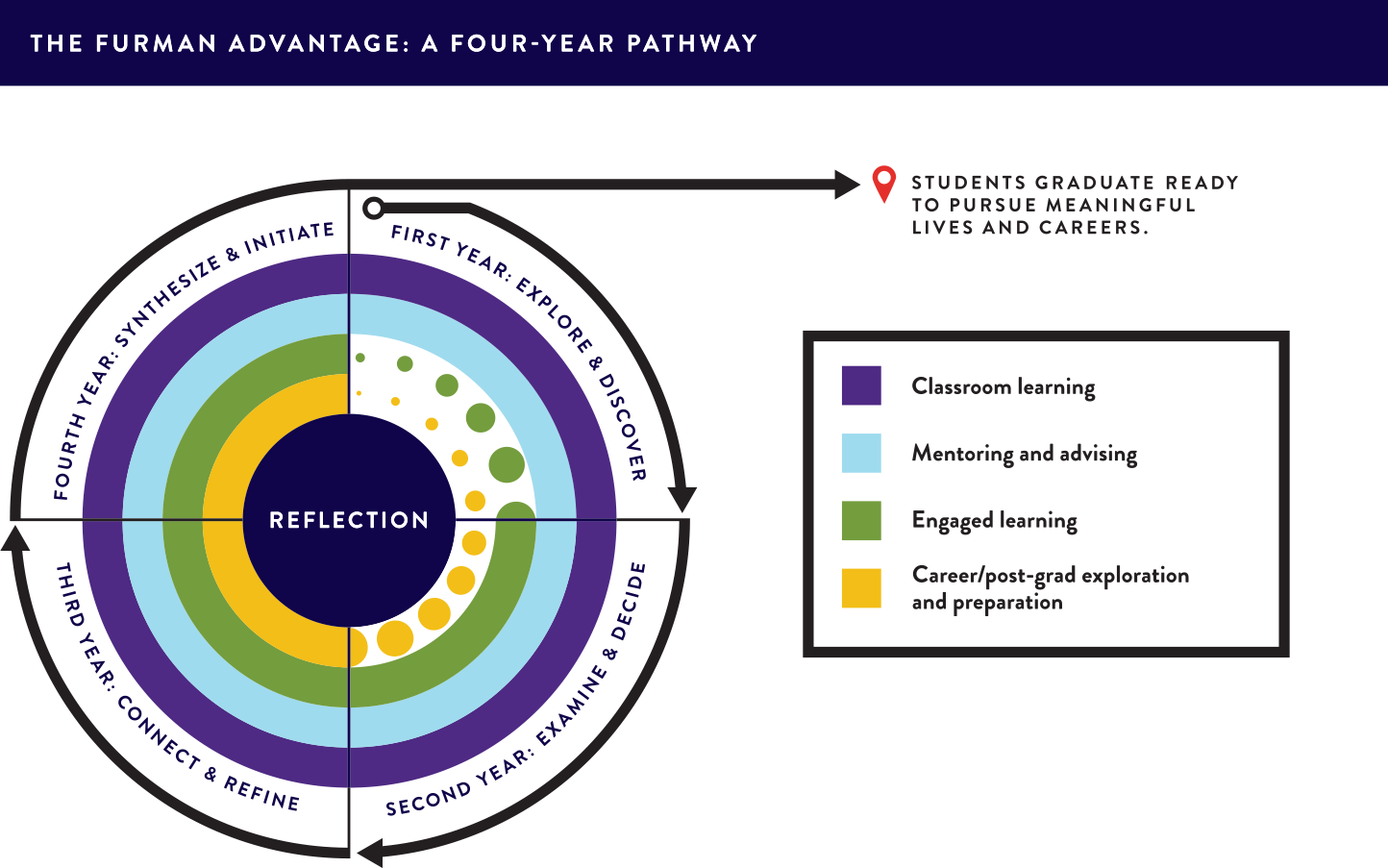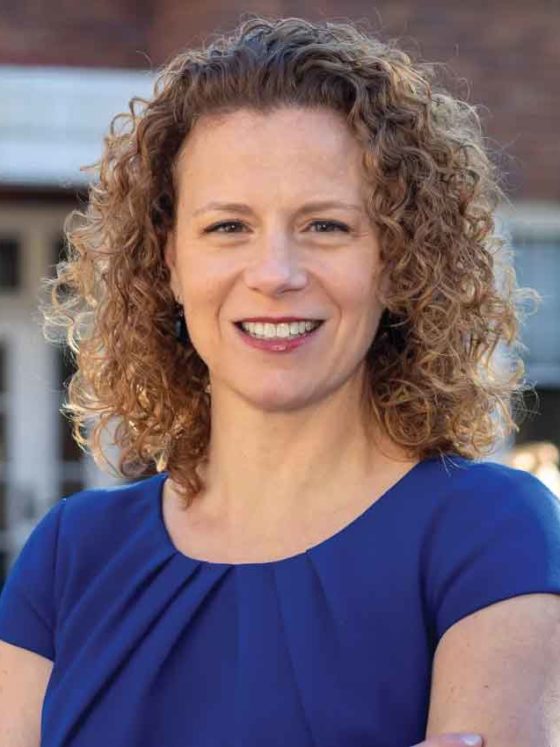THE FURMAN ADVANTAGE
The foundational two-year Pathways program emphasizes mentoring and advising and helps to ease the transition to college. Students take a one-credit hour course each semester for their first two years at Furman. (This past March, the faculty voted to extend Pathways, which had been a pilot program, to all incoming Furman students.)
Pathways plays an important role in not only student success but the university’s success. Gallup has found that belonging, institutional trust, purpose and post-graduation preparation increase affinity, with belonging identified as the most powerful factor in a student’s likelihood to recommend their school to others. Furman’s Pathways program reinforces these elements through its curriculum.
“Throughout the first two years, our hope is that students will hear a common Pathways language and hear similarly themed discussions across campus offices, creating a seamless four-year experience. The idea of scaffolding extends throughout. What are we building? The opportunity for a meaningful career and a life of purpose for all students.” MICHELLE HORHOTA
“I can confidently state that the proposed program would be highly valuable to the students of Furman University and is positioned to be a standard of best practice and provide leadership in the field for (the first-year experience), sophomore programs, and implementation of HIPs (high-impact practices).”
Associate Dean for Mentoring
and Advising, Professor of Psychology
ADVANTAGE
Students meet with their Pathways class, their advisor and a peer mentor each week for 50 minutes. The curriculum focuses on transitioning to college by building a foundation of self-awareness and reflection, helping students learn who they are, what they value and what captures their interest, while also guiding students on time and stress management, study strategies and academic integrity. Students also learn about Furman’s history, including major milestones and pioneers such as Joseph Vaughn ’68, the first Black undergraduate student to attend Furman.
The Pathways course encourages students to think about how to integrate their academics, their engaged learning experiences – such as study away, research and internships – and their career goals. They build résumés, have informational interviews with alumni and learn other basic career skills. Themes of leadership, purpose, active citizenship and impact arise as students learn how to tell their stories by articulating personal strengths and experiences. Students may declare a major at any point during the first two years of their pathway. When they do, students obtain a major advisor in addition to their Pathways advisor, growing their dedicated team of mentors.
Juniors and seniors continue their pathway at the department level, tailoring their learning to their specific majors and building on information they learned during their Pathways years. Through their major, students reflect on what they’re learning and how it positions them for life after Furman, whether in the workforce or graduate school. Juniors and seniors can participate in career treks, panels and fairs; alumni networking; and pre-professional advising in law and health care. Students also may connect with Furman’s institutes through their departments. Career skills and reflection are integrated into coursework and co-curricular opportunities.
Additional Support
This past spring, Furman received a National Science Foundation S-STEM (Scholarships in STEM) grant, which the university has used to develop Pathways in STEM Success – The First-Year Experience, a cohort-based program for students interested in science, technology, engineering and mathematics. The program includes an eight-day pre-college bridge component called SAFE Passage, a customized peer-based curriculum, a Pathways class section with an advisor and a peer mentor in the sciences, and access to research, study away, internships and other engaged learning tools. The program emphasizes identity, belonging, and personal resilience and success identified through signs of flourishing, such as recovery from mistakes and comfort with seeking academic help.

© 2022
Furman University President Elizabeth Davis launched The Furman Advantage in 2016 with an initial grant of $25 million. In 2017, The Duke Endowment provided $2.5 million for Furman to partner with Gallup to help assess its impact. After a second grant of $25 million in March of 2021, The Duke Endowment’s direct investment in The Furman Advantage has reached $52.5 million.
celebrate Commencement.
OF THE CLASS OF 2021
AMAZON
AMERICORPS
APPLE
BANK OF AMERICA
BARINGS
BLACKBAUD
CAPGEMINI
DELOITTE
ELLIOTT DAVIS, LLC
ESRI
FEDERAL RESERVE BANK
GREENVILLE COUNTY SCHOOLS
IBM
JET PROGRAM USA
JP MORGAN CHASE & CO.
MICHELIN
NORTHWESTERN MUTUAL PRICEWATERHOUSECOOPERS
PROJECT HOPE FOUNDATION SCANSOURCE
SCRIBEAMERICA
SPACEX
ST. JUDE CHILDREN’S RESEARCH HOSPITAL
TD SYNNEX
THE PUBLIC INTEREST FELLOWSHIP
U.S. HOUSE OF REPRESENTATIVES WAYFAIR
WELLS FARGO
GRADUATE SCHOOLS
BOSTON UNIVERSITY
CLEMSON UNIVERSITY
CORNELL UNIVERSITY
DUKE UNIVERSITY
EMORY UNIVERSITY
FURMAN UNIVERSITY
GEORGE WASHINGTON UNIVERSITY JOHNS HOPKINS UNIVERSITY
LONDON SCHOOL OF ECONOMICS MEDICAL UNIVERSITY OF SOUTH CAROLINA NEW YORK UNIVERSITY
NORTH CAROLINA STATE UNIVERSITY OHIO STATE UNIVERSITY
PRINCETON UNIVERSITY
UNIVERSITY OF ALABAMA
UNIVERSITY OF CAMBRIDGE
UNIVERSITY OF FLORIDA
UNIVERSITY OF GEORGIA
UNIVERSITY OF MICHIGAN
UNIVERSITY OF NORTH CAROLINA UNIVERSITY OF SOUTH CAROLINA UNIVERSITY OF TEXAS
UNIVERSITY OF VIRGINIA
VANDERBILT UNIVERSITY
WAKE FOREST UNIVERSITY
OF GRADUATES ARE EMPLOYED, ENROLLED IN GRADUATE SCHOOL OR PARTICIPATING IN SERVICE
(6 months after graduation)
CONTINUING EDUCATION 35%
CONTINUING EDUCATION AND EMPLOYED 4%
INTERNSHIP 4%
VOLUNTEER/SERVICE/MILITARY 3%
SEEKING EMPLOYMENT 5%
